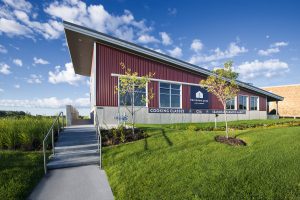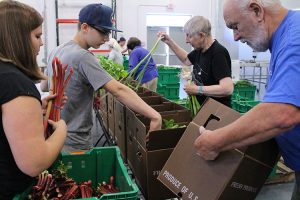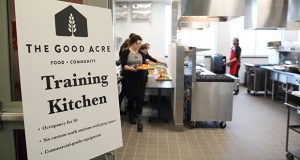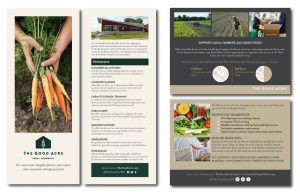
The Good Acre
About This Project
The Good Acre – Food Hubs are critical links for small farmers
Imagine if you had a small farm, just an acre or two, and let’s say you grow turnips. You don’t grow enough turnips to supply a  grocery store year round, and relying on summertime farmers markets is not sustainable. Plus, when you do have turnips to sell, they’re hard to keep fresh. You don’t have the big refrigerated walk-in coolers needed to store them until they get to market.
grocery store year round, and relying on summertime farmers markets is not sustainable. Plus, when you do have turnips to sell, they’re hard to keep fresh. You don’t have the big refrigerated walk-in coolers needed to store them until they get to market.
So, what do you do? How do you sell your turnips?
One way is through a food hub. Food hubs allow small farms and farmers to get their produce and products to people, restaurants, schools and wholesalers, by working together, pooling resources, and sharing the expense of storage, distribution and marketing.
In Minnesota, The Good Acre, is a food hub located in Falcon Heights. Nikki Warner is their communications Director and she says a small farmer who grows turnips and sells them two or three days a week at a farmer’s market, might only sell 40 percent of what they’re growing. The Good Acre can help them. They provide resources and connections to small farmers that allow them to reach multiple new outlets, customers and markets.
 “Whether we are selling extra turnips to a kimchi maker, who can ferment it and sell it at a co-op, or to a school who can roast the turnips and make a really cool dipping sauce; We are making those wholesale connections, so farmers don’t have to.”
“Whether we are selling extra turnips to a kimchi maker, who can ferment it and sell it at a co-op, or to a school who can roast the turnips and make a really cool dipping sauce; We are making those wholesale connections, so farmers don’t have to.”
As a matter of fact there’s a kimchi Maker who works out of The Good Acre. Galen Kanazawa, owner or “Fierce Ferments” makes kimchi with live fermented ingredients, from a traditional family recipe.
“We needed refrigerated storage space in particular. So, I reached out to a local grower to see if I could use their refrigerated storage space, and they said ‘No, but have you have you heard of the good Acre?’”
Galen was able to find space at The Good Acre, and now produces kimchi, pickles and sauerkraut in their kitchens. He also uses their large walk-in coolers to keep his live produce fresh.
It’s one of many examples how small farmers and food producers can access the infrastructure they need to reach larger markets, without having to make costly upgrades on their own land. Warner says many of the local farmers in the Twin Cities don’t even own their land, so it’s cost-prohibitive to get things like coolers, freezers and enough space to sort and distribute their products.
Another food maker is Rachel Banken, who creates a delicious line of organic teas at the Good Acre, called Well-Rooted  Teas.
Teas.
“Over 90 percent of my ingredients comes within 100 miles of here. So, my teas are all herbal teas which means there’s no caffeine in them. And I source my ingredients from small sustainable organic farmers.”
Rachel says she loves creating her teas at a food hub because of the sense of community and connection it brings her.
“When you walk in, you just immediately can tell this is a place that’s run by people who take their environmental commitment and their commitment to the agriculture to the local agriculture economy very seriously. These people are working really hard and they’re so knowledgeable at what they do.”
Not just for farmers, The Good Acre provides space for the community too. They provide culinary training, cooking classes, farm shares, seminars and events that support the local farming community. Nikki Warner says at the end of the day, they’re trying to build an alternative food system to “Big Ag.”
“You know there are ways to support farmers, from the tea in your cup, to the kimchi in your scrambled eggs, to what your kids are eating in school.”
 40 unique food Products are Created and distributed through Good Acre, 78 cents of each farm share dollar goes back to farmers, and 90,000 lbs produce are delivered to public schools every year. Food Hubs like the GOOD ACRE are critical links in a sustainable food network. They work hard to make farming alive.
40 unique food Products are Created and distributed through Good Acre, 78 cents of each farm share dollar goes back to farmers, and 90,000 lbs produce are delivered to public schools every year. Food Hubs like the GOOD ACRE are critical links in a sustainable food network. They work hard to make farming alive.
Nikki Warner says the Good Acre seeks to bridge a gap in our food system.
“If we don’t have farms, then we don’t have local food, and that is what the Good Acre works to ensure that farmers are getting paid a fair wage, so that they can keep doing what they’re doing being stewards of their land. Having multi generational farms and being able to raise a family on a farm, those are really important things and those are some of the big reasons why there’s less and less farmers out there, because they know it’s not sustainable. So, if we can create markets for farmers to be able to make this something they can earn a livelihood doing then the whole food system wins.

